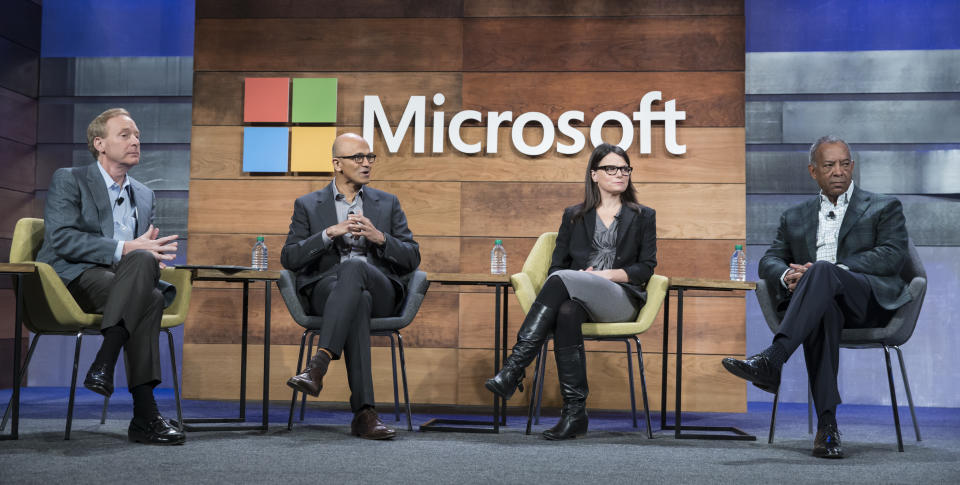February’s job market numbers easily exceeded economists’ expectations, providing a ray of sunlight in an otherwise dark news cycle weighed down by the worsening strife in Ukraine.
Workers are wielding more power in a labor market characterized by shortages across industries. Employers added 678,000 jobs in February, far more than consensus estimates, signaling a tightening labor market.
“It’s certainly a job seekers market at the moment,” CEO of Randstad Sourceright Mike Smith told Yahoo Finance Live in a segment after the release. “We see that really in the last two decades, we haven’t seen this level of supply-demand constraints.”
Randstad Sourceright is a global talent acquisition firm that seeks to use high-output technology to help businesses and firms meet their talent and employment needs.
With more supply constraints than any other time in the past couple of decades, employers have been forced to increase incentives for potential workers. “That actual cost of not being able to fill critical roles for organizations at the moment has really forced them to rethink and reconsider their compensation packages, but also getting outside the box on transforming their traditional approaches to flexible work-life benefits and overall wealth packages for their particular candidates that they’re trying to hire as well as their existing workforce at the moment,” Smith said.
With inflation continuing to increase (the CPI increased 7.5% year-over-year in January, the biggest rise since 1982), some companies have given employees a raise to help them stay afloat. The Biden administration has emphasized that substantial gains in the labor market have begun to take away some of the pain of the rising tide of inflation.
“There are some key sectors, warehousing, transportation, leisure and hospitality, I believe retail trade, where wages are actually surpassing the rate of inflation,” Jared Barenstein, a member of the Council of Economic Advisers in the Biden administration, told PBS. “So, it is something that we need to see, though, much more broadly across the wage scale, and the way to do that is to implement the president’s agenda, to keep the demand strong, keep the labor market churning while acting on the supply side.”
Bigger companies, in addition to small businesses, are making these changes, Smith said. “We do a lot of work for some of the Fortune 500 organizations at the moment, in terms of talent acquisition outsourcing,” Smith said. “And what you see among those organizations is the difference in total compensation packages that they can offer is not that different. [That reality has] forced them to really think about, ‘how can I offer a value proposition that really stands out in the market at the bottom and it helps me get those critical skills that are going to allow us to drive growth?’”
Even with workers acquiring greater bargaining power recently, some argue that wages are still too low. A new report released by the Treasury Department with help from the Justice Department, Labor Department, and Federal Trade Commission found that, due to asymmetrical information and other corporate practices, wages are about 20% lower than where they would be in a perfectly competitive market.
“These conditions can enable firms to exert market power, and consequently offer lower wages and worse working conditions, even in labor markets that are not highly concentrated,” the report said.
As requirements for positions will continue to evolve, Smith noted, so will the makeup of companies. Diversity and inclusion standards have emerged as a top priority for firms across various sectors of the economy. Some corporations are hoping to rebrand themselves as more diverse after decades of being majority-white and male-dominated.
DocuSign (DOCU), a publicly traded company specializing in electronic documents, recently made headlines after hiring its first diversity officer, Iesha Berry. She had previous experience in similar rules at other big firms like Microsoft (MSFT) and Slalom.
“This understanding of minimum requirements that were applicable in the market five years ago are absolutely being challenged at the moment,” he noted. “And there’s a heavy diversity, equity, and inclusion element to that, to understand how by changing the minimum qualification requirements that we thought of for a certain role, does it give us access to new pools of talent that we haven’t thought about previously, albeit that’s a very difficult balance to strike when you have a stakeholder a hiring manager community that is still demanding skills relevancy in the current environment.”
Ihsaan Fanusie is a writer at Yahoo Finance. Follow him on Twitter @IFanusie.
Follow Yahoo Finance on Twitter, Instagram, YouTube, Facebook, Flipboard, and LinkedIn









